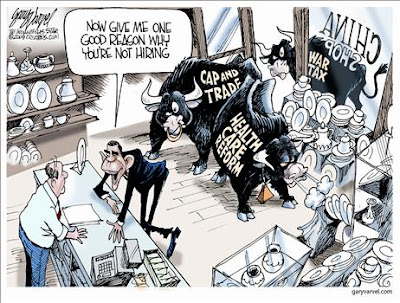Pirrong Debunks the Keynesian
Debunking
By Robert Higgs
 As the idea of regime uncertainty
has gained ground in recent years as a partial explanation of the economy’s
failure to recover quickly and fully, economists and others invested in
Keynesian thinking have begun to strike back. One such Keynesian debunking of
regime uncertainty was offered recently by Gary Burtless and seemingly endorsed
by Mark Thoma. Now, Craig Pirrong, an economist at the University of Houston,
has debunked Burtless’s arguments.
As the idea of regime uncertainty
has gained ground in recent years as a partial explanation of the economy’s
failure to recover quickly and fully, economists and others invested in
Keynesian thinking have begun to strike back. One such Keynesian debunking of
regime uncertainty was offered recently by Gary Burtless and seemingly endorsed
by Mark Thoma. Now, Craig Pirrong, an economist at the University of Houston,
has debunked Burtless’s arguments.
Pirrong uses options pricing theory
to show why the Keynesians are missing the point of the regime uncertainty
concept and why, even on their own terms, their arguments for disregarding
regime uncertainty and simply pumping up aggregate demand are wrong.
To adapt a familiar saying: first they ignore you, then they ridicule
you, then they embrace the idea and claim that they had it first. We are now
passing through Stage II.
Although I am pleased that the
concept of regime uncertainty has come to be recognized in some quarters as an
important part of our understanding the economy’s operation, I continue to be
disconcerted that many of those who speak of it, including some of those who
speak favorably of it, fail to understand its full scope. As I understand
regime uncertainty, it has to do with widespread inability to form confident
expectations about future private property rights in all of their dimensions.
Private property rights specify the property owner’s rights to decide how
property will be used, to accrue income from its uses, and to transfer these
rights to others in various voluntary arrangements. Because the content of
private property rights is complex, threats to such rights can arise from many
different sources, including actions by legislators, administrators,
prosecutors, judges, juries, and others (e.g., sit-down strikers, mobs).
Because of the great variety of ways
in which government officials can threaten private property rights, the
security of such rights turns not only on law “on the books,” but also to an
important degree on the character of the government officials who administer
and enforce the law. An important reason why regime uncertainty arose in the latter
half of the 1930s, for example, had to do with the character of the advisers
who had the greatest access to President Franklin Roosevelt at that time—people
such as Tom Corcoran, Ben Cohen, William O. Douglas, Felix Frankfurter, and
others of their ilk. These people were known to hate businessmen and the
private enterprise system; they believed in strict, pervasive regulation of the
market system by—who would have guessed?—people such as themselves. So, as bad
as the National Labor Relations Board was on paper, it was immensely worse (for
employers) in practice. And so forth, across the full range of new regulatory
powers created by New Deal legislation. In a similar way, the apparatchiki who
run the federal regulatory leviathan today can only inspire apprehension on the
part of investors and business executives. President Obama’s cadre of crony
capitalists, which he drags out to show that “business is being fully
considered,” in no way diminishes these worries.
Thus, regime uncertainty is a
multifaceted and somewhat nuanced concept. Many economists don’t like it
because it cannot be measured and compiled along with other standard macro
variables in a convenient data base. But, as I have tried to show for fifteen years,
various forms of empirical evidence can be and have been brought to bear to
show that regime uncertainty is not simply a figment of the analyst’s
imagination or an all-purpose club with which the Chamber of Commerce whacks
the government’s every move to increase taxes or augment regulations. Anyone
who actually manages a business or makes serious investment can readily
understand the idea. Keynesian economists, who generally do not manage
businesses or make serious investments, view the idea as merely something their
ideological opponents toss out to obstruct the application of their “science”
in policy making. It is good to have analysts such as Craig Pirrong showing
that the Keynesian rejection of regime uncertainty has no firm foundation.
No comments:
Post a Comment